Holzindustrie Schweighofer
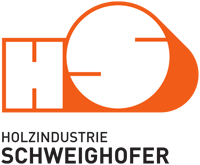 | |
| LLC | |
| Industry | Wood, Manufacturing |
| Founded | 2002 (in the present structure) |
| Headquarters |
Vienna, Austria (Schweighofer Group, Holding) Sebes, Romania (Holzindustrie Schweighofer) |
Key people | Gerald Schweighofer |
| Products | timber, construction wood, glue lam products, blockboards, concrete formwork panels, pellets, briquettes, DIY- wood products |
| Revenue | appr. 500 Mio Euro in wood business (2013) |
Number of employees | more than 2.500 (only wood business, 2014); Group: 3.100 (2015) [1] |
| Website | http://www.schweighofer.at/ |
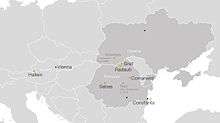


Holzindustrie Schweighofer is part of the Schweighofer Group and has its roots in an Austrian family business with more than 400 years of experience in woodworking. Today’s key business units are wood industry, viscose pulp production, forestry, bioenergy production and real estate.
Schweighofer has been active in Romania since 2002 and opened its first sawmill in 2003. Nowadays the company is leading in European woodworking business, employs more than 2.500 people in four production sites in Romania and is also active in the Czech Republic, Bulgaria, Germany and Ukraine. The company owns three saw mills in Romania in Reci, Rădăuţi and Sebeş, of which the latter has been accused to deal in illegally logged woods.[2][3]
History
17th to 20th century
For the Schweighofer family wood working has a long tradition, which was handed over from generation to generation. The first related remark in official documents was made in the year 1642. The actual success story started in 1956, when Franz and Maria Schweighofer took over the family owned saw mill in Brand, Lower Austria. At that time the annual mill capacity was about 1.000 m³.
Gerald Schweighofer started his career in the company in 1975. Due to his innovative spirit and his readiness to assume a risk, he opened the worldwide unique profiling line for small diameter logs at the headquarters in Brand/Austria, in 1977. Holzindustrie Schweighofer opened Europe’s largest saw mill (at that time - 1984) in Ybbs an der Donau/Austria.
After take over and enlargement the saw mill in Sollenau/Austria started processing in 1991. Holzindustrie Schweighofer took over the biggest and most modern saw mill in Zdirec in the Czech Republic (1996).
After taking over the saw mill Bad St. Leonhard/Austria, in 1997, and another saw mill in Plana/Czech Republic, Holzindustrie Schweighofer reached a total sawing capacity of 3 Mio. m³ in six different mills. Moreover, the glue lam mill Lamco was built in cooperation with the Japanese company Maiken and the Schweighofer Privatstiftung was founded.
Holzindustrie Schweighofer merged with Enso Timber, in 1998, and became the third largest saw milling company in the world. The Schweighofer family sold its shares and hence all sawmills in Austria and the Czech Republic to Stora Enso Timber (2001).
In 2011, the Schweighofer Group bought the M-real Hallein GmbH in Austria.
History in Romania
- In 2003 Holzindustrie Schweighofer started production in the new and modern sawmill in Sebeş, Romania
- In 2007 a 4 stars hotel was opened in Rădăuți - The Gerald´s Hotel.
- In 2008 after finalization the second saw mill in Rădăuți, Romania started operations.
- In 2009 the Romanian Swedwood manufactory was taken over in Siret, close (12 km) to the second mill in Rădăuți. After the modernization and enlargement of the factory solid wood panels have been produced there.
- Since 2010 Holzindustrie Schweighofer BACO produces blockboards and concrete formwork panels in the previous Finnforest factory in Comăneşti.
Production units
Holzindustrie Schweighofer operates at present 5 production units in Romania: Three sawmills in Sebeș, Rădăuți and Reci (county Covasna) and two factories for blockboard and glue lam products. In 2015 the company bought another sawmill in Kodersdorf in Germany from the Klausner Group. In Kolomyja (Ukraine) the infrastructure for another sawmill is being prepared.[4]
Sawmill Sebeș

The sawmill in Sebeș (760 employees) was Schweighofer‘s first factory in Romania and started operations in 2003. 90% of the logs are bought in Romania – the rest is imported from other countries. The annual cutting is 1,45 Mio m³, the planing capacity is 500.000 m³ per year. Additionally 30.000 tons of briquettes are produced yearly. With an additional pellets production the annual pellets production could be raised up to 125.000 tons/year.[5]
Sawmill Rădăuți
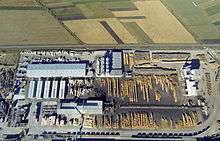
The second Schweighofer factory in Romania (600 employees) was opened in 2008. 60% of its log consumption is bought in other countries and 40% in Romania. The annual cutting amounts to 1,45 Mio m³, the annual planing capacity is 410.000 m³, glue lam products (POST) 144.000 m³. Additionally 240.000 tons of pellets are produced per year. In autumn 2014 the new BEAM production started with a capacity of 100.000 m³ glue lam panels per year.[6]
Sawmill Reci
The sawmill in Reci, Covasna country, is Holzindustrie Schweighofer’s newest production unit. Following a 150 million euro investment,[7] the factory commenced operations in August, 2015. The production unit spans over 70 hectares[8] and has a cutting capacity of 800.000 m3 round wood.[9] The wood processed in Reci will be coming from Romania, as well as other countries such as Poland, Hungary, Austria, Croatia, Slovenia, Ukraine, Belarus, Russia etc. The factory employs 650 people at full capacity.[10]
Sawmill Kodersdorf
In 2015 the Schweighofer Group took over the sawmill in Kodersdorf (Germany) from the Klausner Group, which will do business under the name of Holzindustrie Schweighofer GmbH. Operations were transferred in October 2015. All employees were hired by Holzindustrie Schweighofer. The factory processes spruce and pine. Its capacities per year are 300.000 m³ planed products and 700.000 m³ kiln drying.[11]
Edge glued panels factory Siret
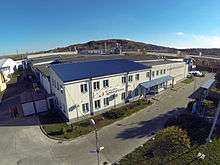
The edge glued panels factory in Siret was taken over from the IKEA-subsidiary company Swedwood in 2009. 270 employees are working there. 70.000 m³ of finished products and 20.000 t of briquettes are produced annually.[12]
Blockboard factory Comănești
In 2010 Schweighofer took over the blockboard production factory from Finnforest in Comănești. With 750 employees and its annual production volume (135.000 m³ blockboards) it is the world's largest blockboard production in one location. Additionally 25.000 t pellets are produced per year. 75% of the processed raw material sources from Holzindustrie Schweighofer. Since its take over the factory has been expanded very generously in several steps.[13]
Sawmill Kolomyja (being prepared)
In Kolomyja (Ukraine) another sawmill is planned, at present the infrastructure is being prepared. Investment: 50 Mio Euro.[14]
Business areas
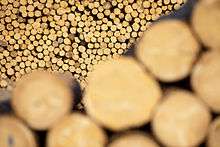
The core areas of business of Schweighofer Group are:
- Production and processing of wood products
- Production of bioenergy
- High quality viscose pulp production (Hallein, Austria )
- Trade of wood products
- Forestry
- Real estate
- Hotel
Wood industry
The key business of Schweighofer Group is the wood industry with factories in Romania and Germany. Besides classic sawmills, Holzindustrie Schweighofer also runs two wood working factories. Main products are timber, construction and packaging timber, planed (semi)finished timber, glue lam products, finger jointed products, blockboards, concrete formwork panels, pellets and briquettes.[15]
Bioenergy production
Schweighofer Group runs 4 bioenergy power plants in Romania and one in Austria (Hallein). In these CHP (cogeneration heat and power plants) barks, wood shavings and wood chips are used for the generation of energy. Schweighofer is also share holder of the biomass power plant in Suceava, Romania.
Timber trade
Schweighofer holds 25.1% of the shares of the wood trading company DABG. Timber trading activities – focussing on North Africa and Middle East - are done by this subsidiary company.
Viscose pulp production
Since 2013 Schweighofer Fiber (Hallein, Salzburg, Austria) has been producing high quality viscose pulp, that is used for the production of e. g. textiles. 240 employees produce 150.000 tons of viscose pulp (for viscose fiber and nitrocellulose).
The production of viskose pulp influenced the economic location Hallein. In 2015 the pulp factory celebrated its 125th anniversary. Besides pulp production the company today is into bio-energy and long-distance heating as well. The location is being modernised. An example is the new automatic loading terminal, which is used by traders e. g. of pellets since May 2015. The storage capacity is 1.000t and the annual handling capacity is 40.000t of pellets.
Forestry
The Schweighofer owned forests in the Czech Republic and Romania are managed by qualified forestry experts according to the principles of near-natural and sustainable forestry. All forests managed by O.S. Cascade Empire (part of Schweighofer Group) in Romania are FSC certified. In Romania however Schweighofer is mentioned in attacking Retezat National Park.[16]
Real estate
Schweighofer Group develops and runs real estate projects in inner cities of Austria and Canada.
The Gerald’s Hotel
Opened in 2007 The Gerald’s Hotel is one of the most modern hotels in Northern Romania and offers high class amenities and services to international travellers. The Gerald’s Hotel (4 stars) has 99 double rooms and it is located close to the municipal park and the City Hall of Rădăuți.
Schweighofer Prize
The Schweighofer Prize awards innovative ideas, technologies, products and services concerning the whole value chain in order to strengthen the competitiveness of the European Forest Based Sector. It has been presented every second year since 2003. It is endowed with a total prize money of €300,000 before tax. The prize is divided into one Main Prize and several Innovation Prizes.
- Prize winner 2013: Dott. Ing. Federico Giudiceandrea, MiCROTEC GmbH, Brixen, Italy
- Prize winner 2011: Dieter Siempelcamp, Siempelcamp GmbH & Co. KG, Krefeld, Germany
- Prize winner 2009: Prof. Dr. Gerd Wegener, Professor für Holztechnologie, University of Technology, Munich, Germany
- Prize winner 2007: Prof. Matti Kairi, Professor, Technical University of Helsinki, Finnland
- Prize winner 2005: Prof. Julius K. Natterer, Director of institute for wooden construction (IBOIS), ETH Lausanne, Switzerland
- Prize winner 2003: Hans Hundegger, Otto Martin enterprises, Allgäu, Germany
Controversy
On May 22, 2014 a public letter from Ukrainian ecological organization Kyiv Ecology and Culture Center appeared indicating that construction of wood processing factory in Ivano-Frankivsk region of Ukraine would require 500 000 tons of gravel to be excavated from local river beds, thus threatening Carpathian ecology.[17] Ecologists have never received any response from company officials.
Further reading
- Leutgeb, Rupert: Franz Schweighofer. 80 de ani de aur. Nord Forest Edition, Viena 2008
External links
- Holzindustrie Schweighofer: www.schweighofer.at
- Schweighofer Fiber: www.schweighofer-fiber.at
- The Gerald`s Hotel: www.geraldshotel.com
- Schweighofer Prize: www.schweighofer-prize.org
References
- ↑ "Schweighofer Website, About us". November 3, 2015.
- ↑ Klawitter, Nils (May 8, 2015). "Clear-Cutting Romania: Logging Threatens One of Europe's Last Virgin Forests". Spiegel Online.
- ↑ "Public Search". info.fsc.org. Retrieved 2016-02-10.
- ↑ "Holzindustrie Schweighofer – Production Sites". Retrieved 2015-11-03.
- ↑ "Holzindustrie Schweighofer – Our Plant at Sebes". Retrieved 2015-11-03.
- ↑ "Holzindustrie Schweighofer – Our Plant at Radauti". Retrieved 2015-11-03.
- ↑ "How does Covasna county economy look like, where only one company managed to cross the 100 million euro threshold". Ziarul Financiar, 7 August 2014.
- ↑ "Holzindustrie Schweighofer commences operations in its newest sawmill in Reci". Bursa,27 October 2015.
- ↑ "Holzindustrie Schweighofer commences operations in its newest sawmill in Reci, a 150 million euro investment". Business Magazin, 27 October 2015.
- ↑ "Schweighofer opens a new sawmill in Romania". Mediafax, 27 October 2015.
- ↑ "Holzindustrie Schweighofer – Our Factory at Kodersdorf". Retrieved 2015-11-03.
- ↑ "Holzindustrie Schweighofer – Our Plant at Siret". Retrieved 2015-11-03.
- ↑ "Holzindustrie Schweighofer – Our Plant at Comanesti". Retrieved 2015-11-03.
- ↑ "Schweighofer to build a sawmill in Ukraine". Retrieved 2014-09-24.
- ↑ "Holzindustrie Schweighofer – Products". Retrieved 2015-11-03.
- ↑ gandeste.org
- ↑ http://gazeta.ua/ru/articles/economics/_stroitelstvo-fabriki-v-ivanofrankovskoj-oblasti-grozit-katastrofoj-vsemu-regionu-ekologi/559147?mobile=true